When it comes to declining newspaper, comic and magazine sales, one major issue seems to get scant attention in any of the publishing trade journals I read – the way publishers product is treated at point of sale by newsagents.
Frankly, in many cases, it’s appalling, particularly in many high street WHSmith. But there seems be some reluctance by publishers and their distributors to call them out on it – perhaps in fear WHSmith might take unwarranted revenge on a publisher that puts their head above the parapet, and drop their titles.
First, a bit of context. There’s no doubt that there are a huge number of titles fighting for shelf space in your local newsagent, and as a consequence, demand for that space has been seen as a valuable commodity by WHSmith and the separate company dealing with most distribution into UK mainland newsagents, Connect (previously known as Smiths News, which is not owned bt WHS). I get that, although the amounts involved seem disproportionate to what a publisher gets for that space, especially when you see how that product – especially in the children’s comics section – is maintained (or not, in the case of the WHSmith store above, where the rack is an impossible mess of titles, many or of eyeline for the potential buyers).WHSmith also has a much wider range of titles to offer on its shelves. Supermarkets, by comparison, which command over 40 per cent of news stand sales in the UK, “cherry pick” the bestsellers. They also charge for space and it costs too much for titles such as the weekly 2000AD and Phoenix to have placement in them.
(The Phoenix has said this is why they’re only available in key high street WHSmith, and not those served by the separate WHSmith that serve airports and train stations).
The sale of magazines and newspapers is also perhaps a thankless task for smaller shops. Let’s not forget that every magazine worth its salt positively encourages readers to subscribe to the title in every issue, and point to their digital alternative if they have one. The newsagent is effectively selling products encouraging the customer to buy elsewhere, loosely akin, say, to Sainsbury’s stocking tins of baked beans emblazoned with a screamer announcing baked beans are cheaper in Tesco. So you can see why newsagents – and a big newsagent chain like WHSmith – might be a bit miffed when a publisher starts kicking up a fuss about the way their product is being treated.
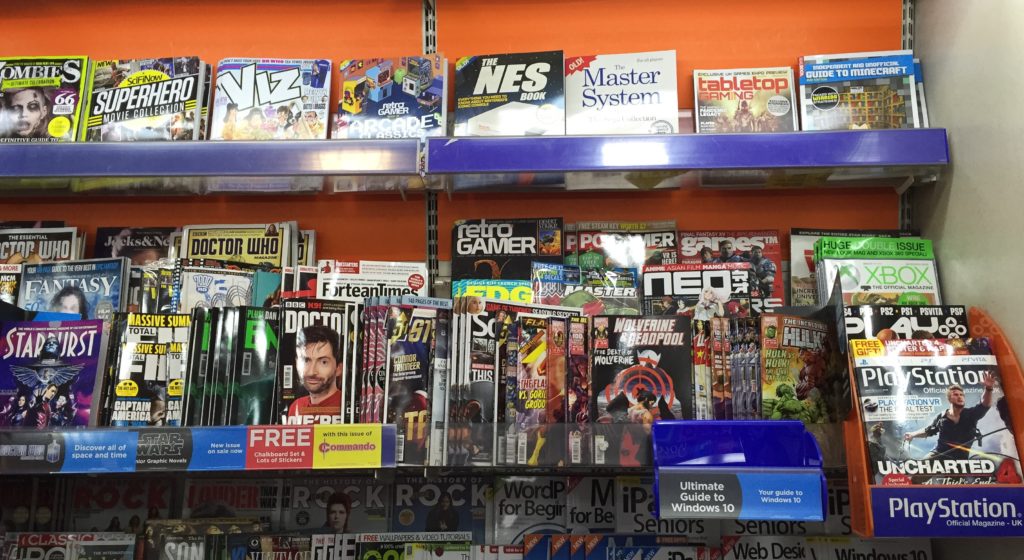
WHSmith Lancaster’s ‘teen title’ section, which includes 2000AD, Panini and Titan’s superhero titles and Commando
Publishers used to be more uppity, of course. When they had better budgets, newspapers – national and local – had teams of staff patrolling newsagents, checking their titles were being displayed correctly. Those days are long gone, which is a shame when you consider they might spend at least £18,000 – £25,000 to get a new comic onto shelves, the sum charged for a launch that includes gaining a spot in most major WHSmith and key newsagents (which in many cases WHSmith control distribution to).
To be honest, I’m pretty stunned that publishers seem to be letting distributors and retailers get away with what they do. It’s not in their interest and neither, I’d argue, is it in the interest of WHSmith, whose management took the decision some years back in my key local store here in Lancaster to effectively half its shelf space educated to magazines – its ‘perishable’ sale items, with a short shelf life of a week in some cases – in favour of what I’d call non perishables – stationery, pens, cards etc.
This just seems a nonsense to me. If the Unique Appeal of your shop is that you sell magazines and newspapers, why make it harder to sell those items by bunching them up, making them impossible to find? (Did you actually see the copies of 2000AD on sale in the picture above?)
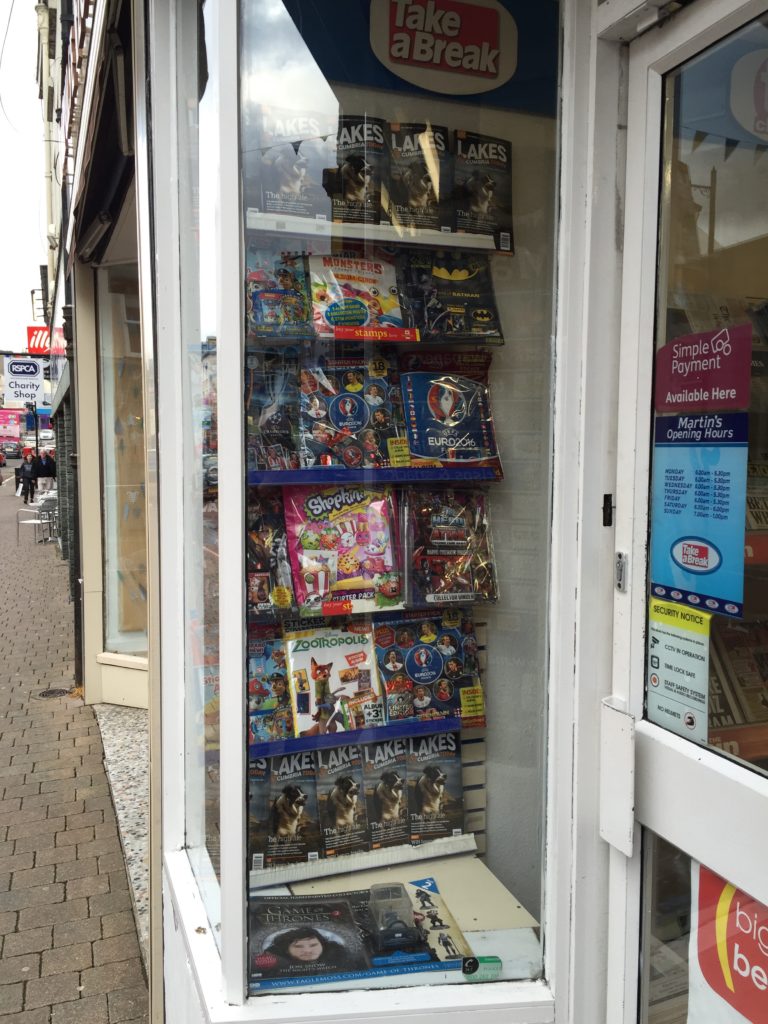
Martins, Kendal. Comics promoted in the window – as you’d perhaps expect for a ‘Comics Town’. This picture was taken recently, well outside its Festival week.
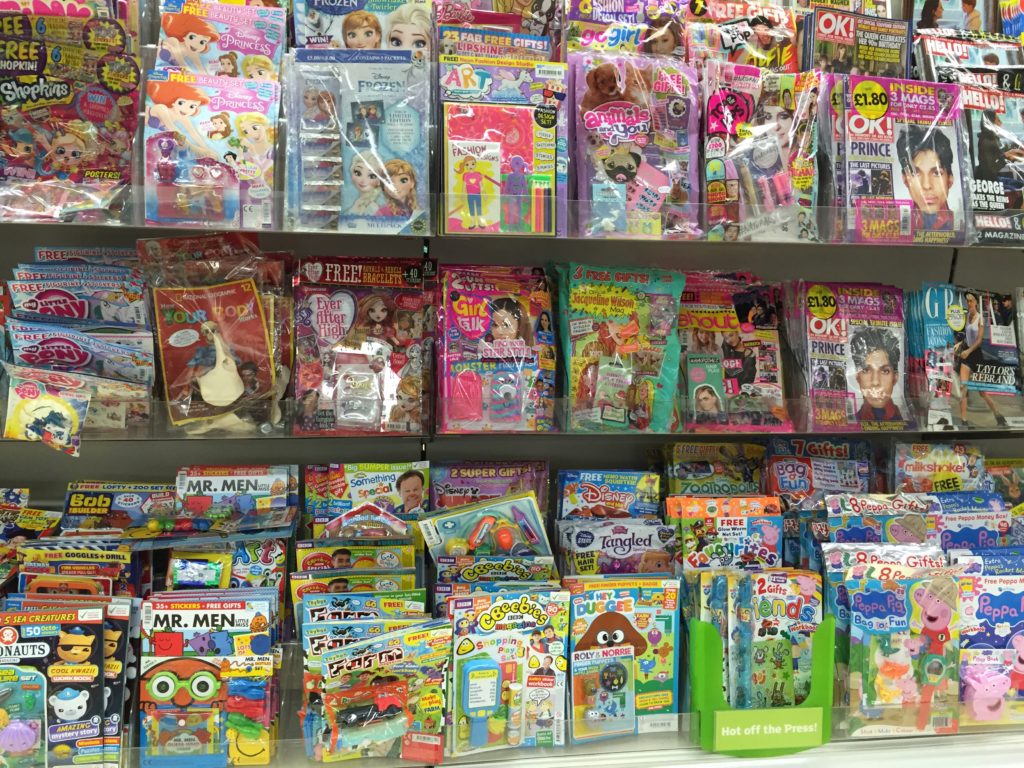
Some of comics on sale in Sainsbury’s Lancaster this weekend. All titles are front facing and clearly visible. It’s a shame they don’t sell 2000AD or Phoenix
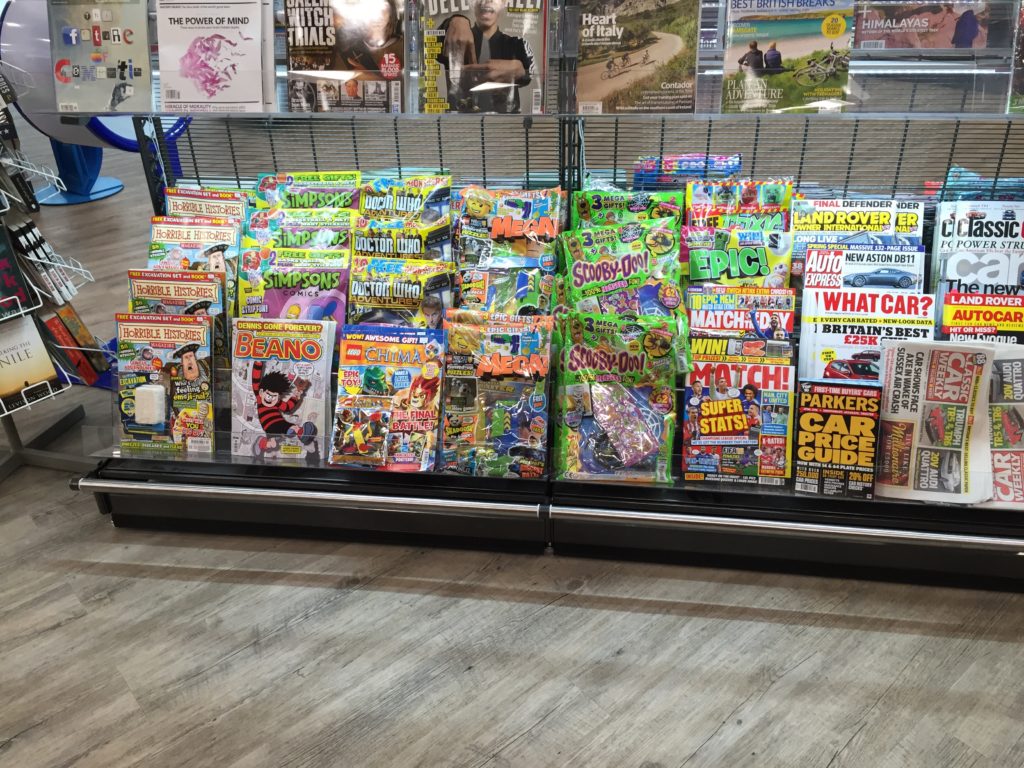
Comics on sale in Booths, Poulton-le-Fylde. Even the smaller range gets better treatment than it does in some WHSmiths
Is there a correlation between the point at which WHSmith took the decision to treat its most valuable part of its business in such an inexplicable manner and the decline in comic and magazine sales? (A decision which has clearly benefitted its stationery sales according to its most recent interim results – PDF link – but in the same period has meant only a 2% rise in Like For Like Sales?)
It would be wonderful to know, but questioning store policy – either directly with local management or via the company’s social media presence – seems a fruitless task, based on both personal past experience and that of other comic fans.
Until that WHSmith gets its act together, I fear we’ll continue to see an overall sales decline for comics, magazines and newspapers – and the squeezing out of smaller publishers from newsagents shelves, no matter the individual appeal of a niche title might have if it got decent visibility unencumbered by financial demands that seem disproportionate to the potential reward.
Now, if you’ll excuse me, I have some comics to move to a more obvious place on a certain newsagents’ shelf…
• Photos of WHSmith and Sainsbury’s used in this article were taken on Friday 29th April. Copyright John Freeman
We note that WHSmith is an entirely separate company to Conect, aka Smtihs News, which handles newspaper and magazine distribution to newsagents large and small across the UK. This article is primarily intended as comment on store presentation, not distribution
The founder of downthetubes, which he established in 1998. John works as a comics and magazine editor, writer, and on promotional work for the Lakes International Comic Art Festival. He is currently editor of Star Trek Explorer, published by Titan – his third tour of duty on the title originally titled Star Trek Magazine.
Working in British comics publishing since the 1980s, his credits include editor of titles such as Doctor Who Magazine, Babylon 5 Magazine, and more. He also edited the comics anthology STRIP Magazine and edited several audio comics for ROK Comics. He has also edited several comic collections, including volumes of “Charley’s War” and “Dan Dare”.
He’s the writer of “Pilgrim: Secrets and Lies” for B7 Comics; “Crucible”, a creator-owned project with 2000AD artist Smuzz; and “Death Duty” and “Skow Dogs” with Dave Hailwood.
Categories: 2000AD, British Comics, Creating Comics, downthetubes Comics News, Featured News, Features
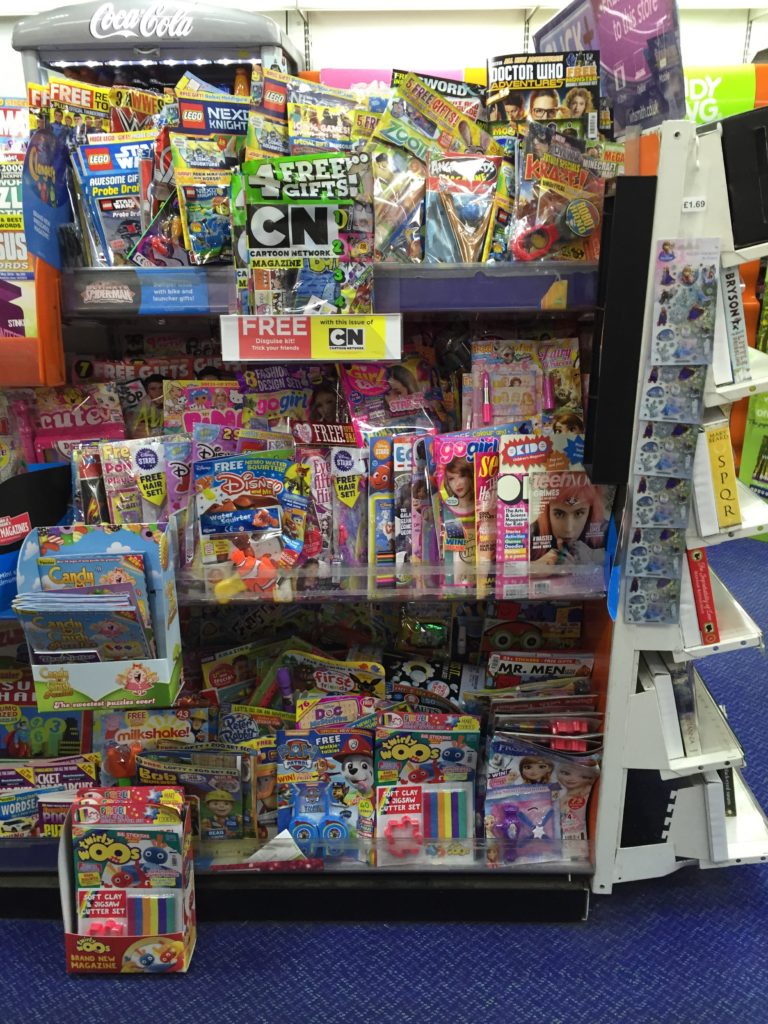
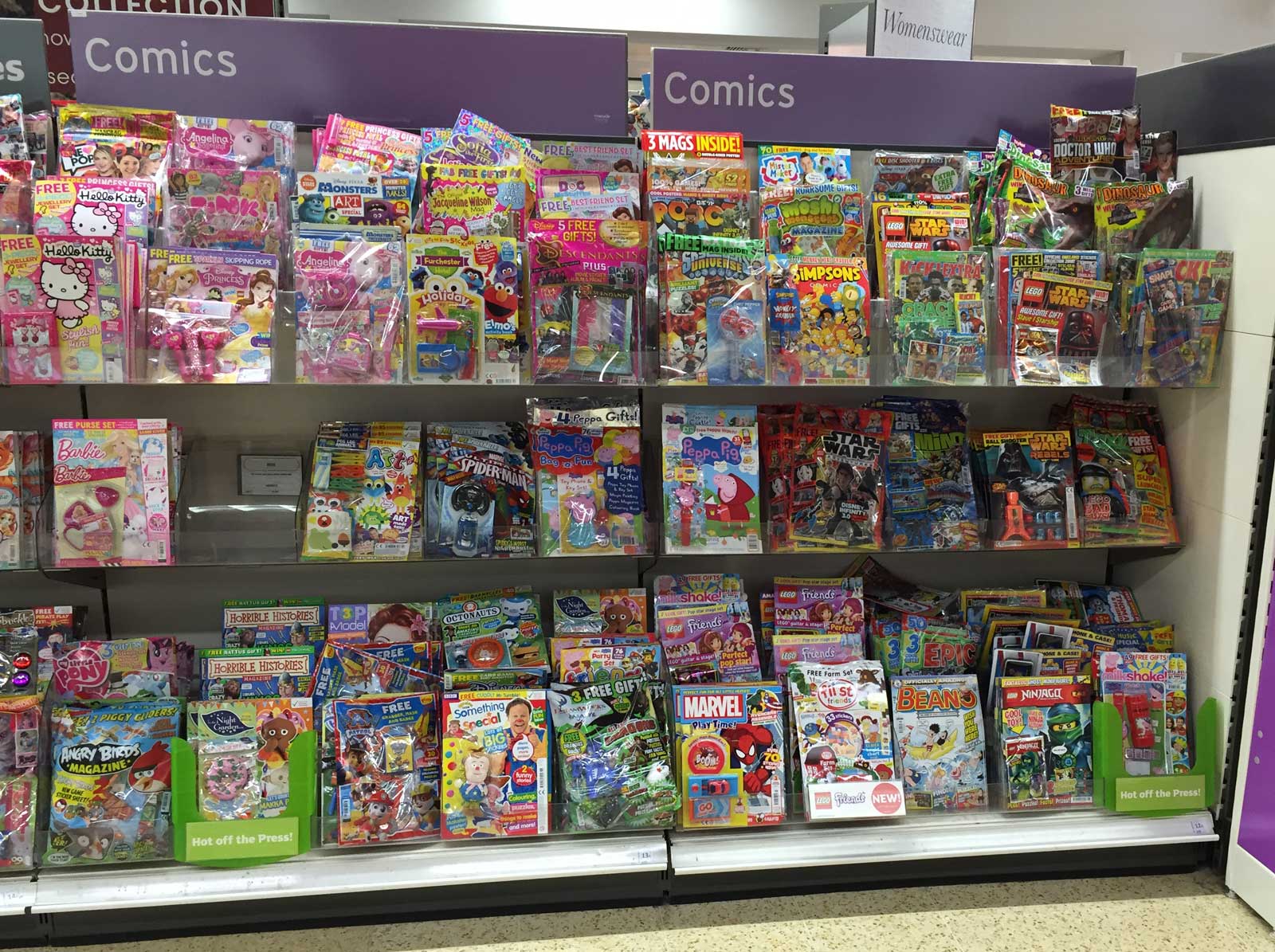 In My View: Why The British Comics Industry is Far From Dead
In My View: Why The British Comics Industry is Far From Dead  Unexpected Delights from a British Comics Meme
Unexpected Delights from a British Comics Meme
It’s a decreasing circle anyway. Why fight it?
Because it needn’t be, with a bit more thought. When rival means to distribute media are on the rise, why is Smiths seemingly make it more difficult for their customers to buy from them? It doesn’t make sense. The way print titles are being treated in some stores is no way to maximise sales.
I have brought this to the attention to Marvel Collector’s Editions Facebook page:
“Just thought I’d bring this to your attention, yet again! , WHSmiths are again NOT displaying your Collected Editions in various stores. I was in Reading, Berkshire today and looked around for this week’s releases – not in the Sci-fi section, not with the children’s comics, not in the top shelf (!)
Looked behind the counter (where some WHS display them) – in the end i asked a member of staff who said they keep then behind the till. He then asked which issues I wanted but I said I don’t know until I’ve had a quick browse (as you do) so he got out one copy of your range and the DC/Titan equivalents.
I couldn’t really stand there browsing so just chose the titles I prefer.
The reason, yet again, is that apparently they get stolen.
Now, granted they may be amongst stuff nicked – but I can’t see any crime wave of comics bring stolen or organised gangs stealing Marvel Comics to trade for drugs or booze – do you?
Every WHS that holds them out of reach and eyeshot they use this reason. It’s bizarre.
Oddly enough they display Titan’s Tales of Doctor Who comic (same sort of size as the Collected Editions) on the shelf next to Doctor Who magazine.
I’ve had this problem in WHSmiths in Reading, Charing Cross Station, Worthing and Walton on Thames – all with the reason of theft.
This means that they are barely on display and many people often prefer to browse issues to check the art or stories etc. I feel that you are missing our on sales – more so than the ‘problem’ of theft ! ”
I posted to them a month later;
“Was in Walton on Thames WHS last week – again – all behind the book counter till.
Same reason.
I think (IMHO ) it’s been a directive from their HQ to place them out of the reach of children.
Possibly because of the content is not suitable for youngsters but they don’t know where to put them.
In Bracknell where I live they have them top shelf with the Sci-fi magazines – at least they are out on display.
I think it is important to have a chance to browse the issue just for making sure it’s what you like or haven’t duplicated in your own US /tpb collections.
Please get to the bottom of this Marvel Collectors’ Editions”
They replied :
“I shall pass these issues on to our distributions manager. Thanks for bringing this to my attention. 😉 “
Another example of a lack of logic when it comes to selling comics, which others have noted also affects Commando
Over on Facebook, one commentator on links to this post says they’ve spoken with some newsagent owners who say they hate comics, because with their bulky free gifts they so hard to display and stack. “It is hard to display them looking neat and tidy,” he comments, “and as soon as you pick one up it catches on and pulls out a few others.
“On top of that the plastic junk on these comics pushes the price up to almost £5 which is more than a lot of parents want to pay for a thin comic. Every issue tends to have the same cover too just with the characters in a slightly different order so there is nothingmuch to differentiate one issue from the next.”
I agree that the bagging of comics is an issue – it turns them into product not publication and purchase becomes even more dependent on brand awareness. However, from the point of view of the retailer, if you have a title that costs more compared to a cheaper title with no free gift, like the Beano or Phoenix, then purely in terms of potential revenue you’re more likely to stock the gifted item. This also explains why part work titles get a higher shelf profile, near front of store in my local Smiths, and why the DVD Packaged magazines, titles with a nominal paper-related aspect on subjects like Steam Railways, History or a key hobby, get better treatment than lower-priced titles.
It should also be noted that When comic sales began to decline in the 1990s the push for free gifts came from retailers, chiefly supermarkets – it wasn’t the publishers. Retailers created a rod for their own backs.
Great article and I agree with most of it. Of course, one of the main problems is that modern comics are so crammed with ‘free’ gifts that it is hard to display them on the shelves. Back in the day, they were much flatter and easier to put on the shelves. Of course, I realize that the consumers and the shops demand gifts these days so it’s chicken and egg…
Noted above in a comment – retailers drove the current format of free gifts from the 1990s on, not publishers
Way back in the 90’s when I was deisgning monthly magazines for Emap we observed WH Smith struggling to reposition itself as a retailer because of declining sales on low-margin print. Fewer books and magazines, more stationery. Less stationery, more toys. Fewer toys more snacks. Etc etc (the irony of their distribution of print becoming closer to a monopoly was chucklesome at the time). I think now the reality is that they are a dead shop walking – there is no place in the modern retail world for them, they are like traditional department stores on the path to extinction, just like Woolworths before them. Supermarkets are the only physical places left with such broad product-range that have a realistic chance of survival and there is no value in flogging the dead horse of Smiths. I think there is a lot of scope to get the more commercial comics sold better in supermarkets. but that’s a long and complicated discussion in itself…
Yes, and we’re already seeing store closures that surely signal no good – especially when you consider WH Smiths if the privatised Royal Mail’s preferred partner of choice when it closes sub post offices. WHSmiths in Balham is to close down at the end of May; and the London Oxford Street Plaza store closes in June, which houses a Post Office. Presumably, this won’t be relocated.
As of February 2016 WHSmith currently operatesd over 1,300 stores, primarily in the UK, comprising 757 travel outlets and 618 high street stores. Distribution is split to the travel outlets and high street stores so publishers have to pay to be in each – which is why you don’t find the Phoenix on sale in your local railway station, as noted in the main article.
Their interim financial results indicates they are having success with their franchise initiative under the brand WHSmith LOCAL. They now have 105 franchisees signed up with 60 stores open.
In the last twelve months WHSmiths has closed its stores in places like Chatham; Grimsby; Falkirk; Sunderland; Wimbledon (although an alternative location is being sought and the closure is due to redevelopment); and the Mander Centre, Wolverhampton.
Despite its apparent woes, its profits were up from £72m in 2015 to £80m in 2016, according to interim results announced on 13th April 2016 (PDF link). The report indicates the company is looking to make multi-million pound High Street savings, which include “rent savings at lease renewal, a more efficient store operating model through greater use of technology and productivity improvements in our distribution centres”.